Steven Spielberg‘s Munich opened a little more than 16 years ago. I’ve just re-read my initial review, posted on 12.8.05, and my reaction was somewhere between thumbs-up, mezzo-mezzo and thumbs-down. I was certainly respectful. But I was really bothered by that way-too-chummy Time magazine cover that trumpeted Munich as Spielberg’s masterpiece — the all-but-consecrated winner of the Best Picture race, the equivalent of tablets chiseled out of Mount Sinai, the very definition of “the one.”
And so I pretty much embarked on a determined detractor campaign to “get” Munich, not because I didn’t admire it as far as it went (although I felt that the third act was underwhelming) but because Time magazine had to be defied and defeated.
I re-watched Munich a few nights ago, and I have to admit that it plays better now. Taken out of the context of Oscar campaigns and whatnot and just absorbed on its own terms, it’s a fascinating thriller — not perfect but mesmerizing — that basically says “murder is bad karma, no matter who’s killing whom and for what reasons.” So I’m stating for the record that I’ve warmed up to it somewhat, and I’m a little bit sorry that I wasn’t more fair-minded when it first came out.
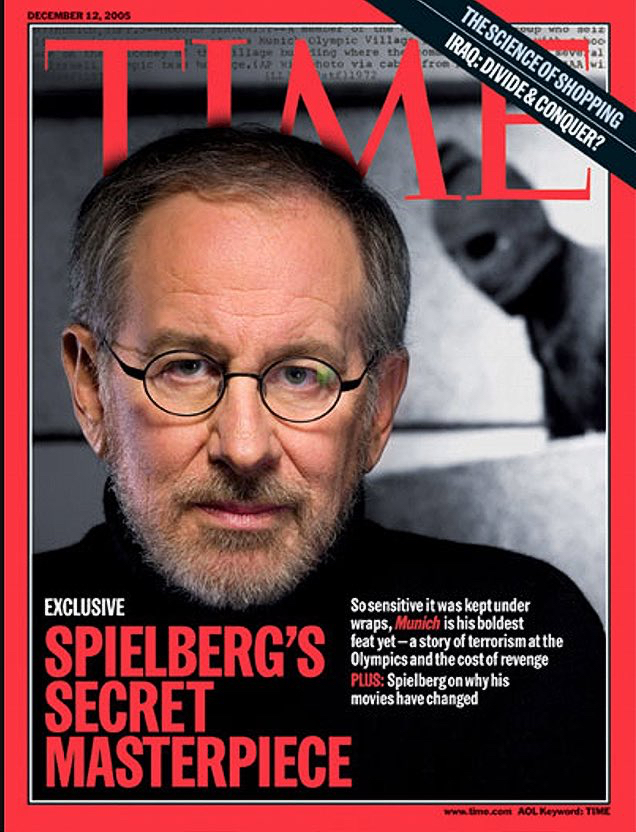
“Munich Shortfall,” posted on 12.8.05: I’m not trying to be a hard-ass for the sake of being a hard-ass, but I can’t get on the Oscar boat for Steven Spielberg’s Munich (Universal, 12.23).
It’s a pretty good movie, but the Best Picture hoo-hah seems a tiny bit forced given what this film truly is in the light of day. If you ask me those prognosticators who’ve already said “this is it!” are conning themselves.
Directed by Spielberg and written (for the most part) by Tony Kushner and Eric Roth, Munich is a longish (160 minutes), thoughtful drama about Israel’s revenge campaign against the perpetrators of the 1972 Munich Olympic Games killings of Israeli atheletes. It’s strong, meaningful and well-intended…but I don’t get all the jumping up and down. I’m talking about the proclamations about it being the new Best Picture front-runner. It’s in the running, I guess, but it sure as shit is no shoo-in.
I spoke last night to a guy who’ll be voting this Saturday with the L.A. Film Critics, and we had both just seen Munich and were talking about the Best Picture Oscar contest, and he said, “I don’t know if [Munich] will even get nominated.”
He may have been overly dismissive, okay, but any seasoned film guy making such a statement should give you a hint about what’s going on here.
I felt the euphoric current at the DGA theatre last year after seeing Million Dollar Baby — I was levitating — but nothing like this kicked in last night inside theatre #5 at the AMC Century City.
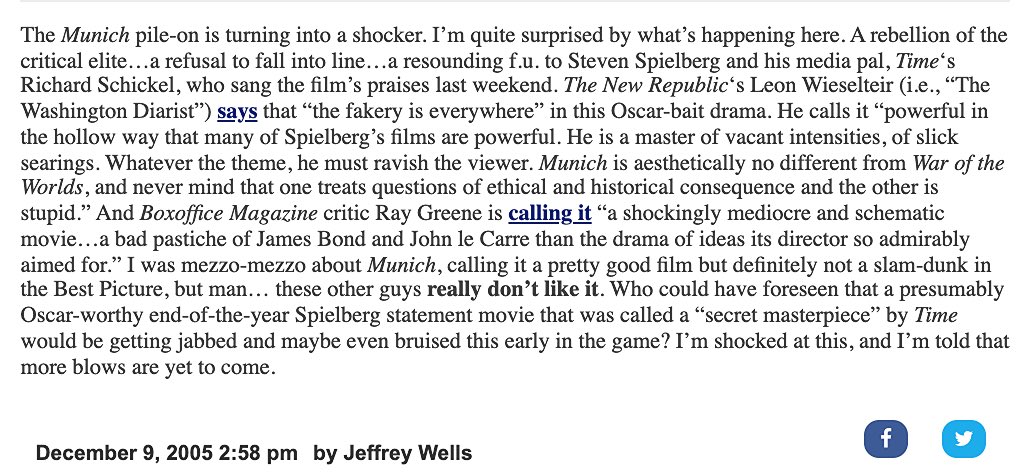
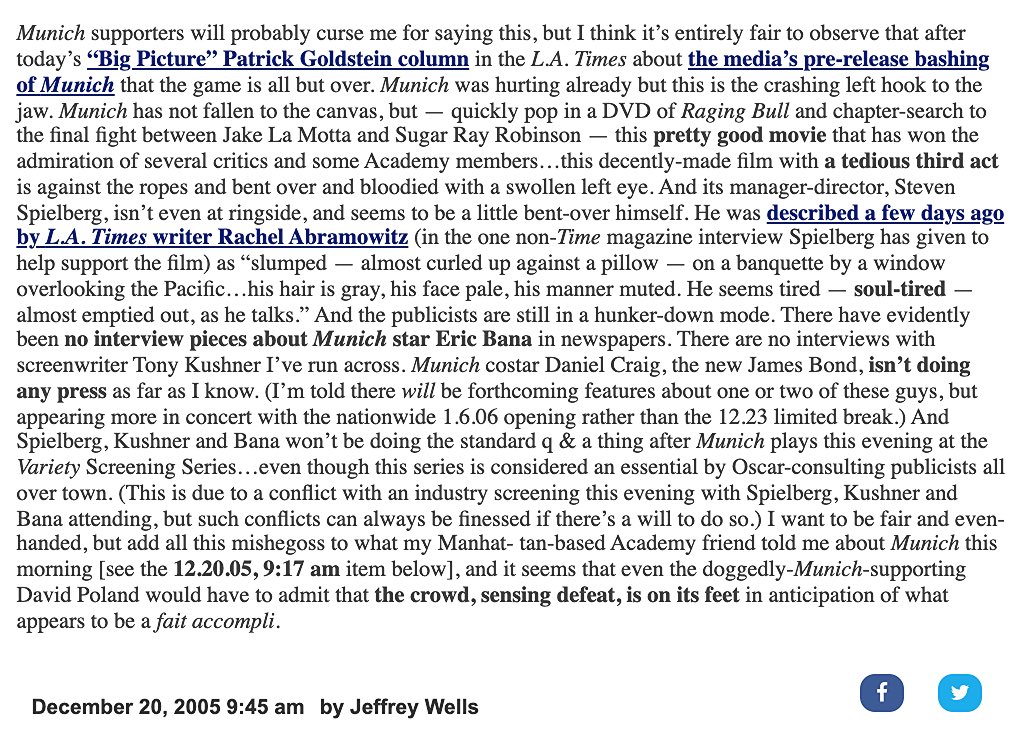
Munich wants first and foremost to say something earnest about the legacy of political murder. It’s a movie that doesn’t quite cry out for peace, but is clearly asking for it. It connects here and there in short bursts, but it mainly achieves a general mezzo-mezzo effect of “okay, good point, we get it.”
Which is why I don’t get the effusive praise from Time‘s Richard Schickel and Fox 411’s Roger Friedman and what I presume will be an oncoming tide of kiss-assers …the Spielberg kowtow brigade looking to show obeisance before power.
David Poland was more measured in his “Hot Button” reaction on Monday night, but he still believes from a hard-nosed realpolitik standpoint that Munich is the presumptive Best Picture winner, and that’s just wrong. Perhaps not inaccurate, but dead fucking “wrong” because Best Picture Oscars shouldn’t go to good movies that say the right thing, etc. but don’t inspire major passion.
Really exceptional movies always get people deep down in one way or another. They provoke, excite…make you choke up. They almost always deliver some kind of intrigue that usually builds and gains upon reflection. But I was not so moved last night.
I didn’t conduct a poll in theatre #5 but I could “feel the room” as the film unspooled and I’d be surprised if Munich aroused any go-for-broke fervor. But I’ll bet every last critic who saw it last night, if you were to pop the question, would say it’s a “good film” or “very strong” or “important.”
And it is that. Munich is a smart and stirring ride. It’s still with me this morning, still pinging around in my rib cage…and yes, I respect where it’s coming from and how Spielberg has organized the journey, for the most part.
And yes, of course, I agree with and support what Munich is saying about the rotten karma that comes out of any act of murder.
Munich is saying that however well justified or rationalized those revenge killings may have been, the air was still befouled and the spiritual effects upon three of the Mossad team — sensitive Israeli assassins played by Eric Bana, Mathieu Kosso- vitz and Ciaran Hinds — were disturbing and unsettling.
(Honestly? I felt almost relieved that two other guys on the team — Daniel Craig’s character and some older guy — don’t seem to pay the price as much. I don’t know why exactly, but I was vaguely comforted by these two being hardcore enough to just do the friggin’ job sans guilt trips.)
As a man with two sons, as a film critic, as a movie fiend…I side with any movie that says “killing is bad” or “killing others…even those who may deserve to die …will let loose a virus in your soul.”
But Munich rarely rises above the level of being dutiful, thoughtful and morally correct. All it is, really, is a sprawling here-and-there procedural with a gathering sense of moral disquiet. That’s a fine and respectable thing, but it doesn’t exactly set off tremors or firecrackers.

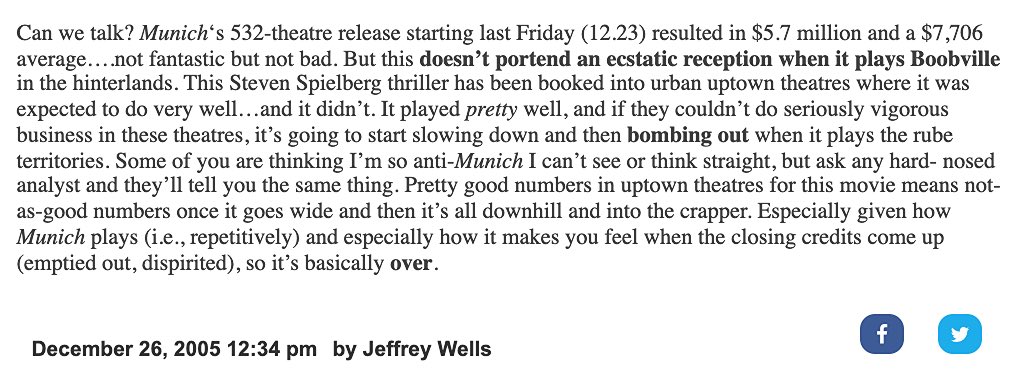
Michael Lonsdale (whose performance as the investigator in Fred Zinneman‘s The Day of the Jackal is one of my all-time favorites) is the best element in Munich. I also quite enjoyed the performance by Mathieu Almaric (last seen in Kings and Queen) as Lonsdale’s churlish son.
There is hoopla over Munich because it’s on the cover of this week’s Time and because the Best Picture situation is very much in flux and everyone’s looking for another Million Dollar Baby to sweep them off their feet.
I can sense a psychological eagerness to consider an end-of-the-year Spielberg movie about the ethical costs and karma of revenge…about the quandaries facing Jews and anti-Zionists in the Middle East as their conflict persists. Journos are primed because it’s that time of year and this is Spielberg-getting-all-morally-earnest-in-December and because everyone’s been saying “Munich is coming, Munich is coming” since last spring.
And everyone wants to savor Spielberg’s second big-statement movie about what good people have done when Jews have been killed because they’re Jews…killed by haters, racists, Nazis, anti-Zionists.
Oskar Schindler did what he did in Schindler’s List and became known to the audi- ence (as he had to his biographers) as a good, compassionate, peculiar, complex man. And the Mossad team led by Eric Bana are reasonably decent guys who go out and do what they do, and the virus of murder and retribution gets into their hearts and systems and they begin to pay the price.
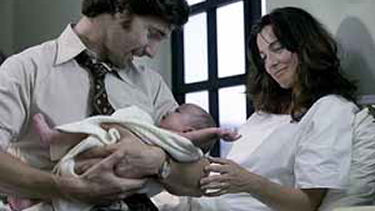
And poor Eric Bana’s character gets the worst of it because he finds it hard to concentrate on making love to his lusciously sexy wife in their Brooklyn apartment because he can’t get those images and sounds of the massacre at the Munich airport in ’72 out of his head…images and sounds he absorbed from TV coverage because he wasn’t there.
I’m not trying to be a smart-ass, but this bizarre sex scene reminded me a tiny bit of Woody Allen’s Alvy Singer not making love to Carol Kane in Annie Hall because he can’t stop talking about the Kennedy assassination and the Warren Report.
Is Munich profound? Is there anything earth-shaking here? In what way does this film step out and grab you by the shirt collar and say, “Wake up!” In what way does it rock anyone’s world in terms of technique, even?
Okay, it feels in some ways like a ’70s film…but that’s not making me shudder or leap out of my seat as I acknowledge this.
The most riveting portions, as you might expect, are about how the killings of the members and supporters of the Munich operation (the core group was known as “Black September”) are carried out, and what goes wrong. The strongest happen early on — a killing in Rome and then another in Paris, which involves a family man and his daughter.
There’s a particularly effective portion involving a pretty woman at a London hotel who gets briefly involved with Bana and Hinds, and a killing results, and then another killing. I don’t want to spoil but the whole cause-and-effect sequence is both sad and shocking.

Tony Kushner’s script gives each Doubting Thomas character a speech just as he starts crumbling, or just before fate is about to take a hand. There’s a certain wordy literalness going on here that isn’t quite as effective as Spielberg and Kushner would like it to be.
Munich ends in New York City with a long shot of a certain downtown landmark. A friend feels this shot was overdoing things a bit, but at least Spielberg doesn’t go in for a closeup, and the CG image is quite haunting.
I have gotten to the point where Janusz Kaminski‘s cinematography is starting to blatantly turn me off. He has become the one dp whose work really and truly irritates me.
Every film Kaminski has shot for Spielberg — War of the Worlds, The Terminal, Catch Me If You Can, Minority Report, A.I., Saving Private Ryan, Amistad and now Munich — has looked more or less the same to me, regardless of the theme or mood. I’m referring to the Kaminski palette of slightly desaturated color, a slightly misty soft-focus look, starchy white light flooding through windows during daytime scenes, a lack of sharpness, and a bizarre fondness for grain.
I think that calling this film Munich was a little bit of a chickenshit move. It should have simply been called Vengeance. I realize that the “Vengeance” book it’s partly based upon has blemishes against it, but vengeance is what this movie is primarily about, and Spielberg should have just copped to that.












